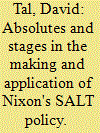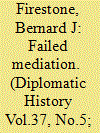| Srl | Item |
| 1 |
ID:
126736


|
|
|
|
|
| Publication |
2013.
|
| Summary/Abstract |
President Richard Nixon and his National Security Adviser, Henry Kissinger took great pride in their success to achieve agreements on the limitation of Anti Ballistic Missiles and the Interim Agreement on Strategic Missiles with the Soviet Union. For Nixon, this agreement was not only an achievement that had been denied to his predecessor, it also seemingly represented the success of his own approach over that of his predecessors. Nixon-in tandem with Kissinger-intended to link arms control negotiations with the Soviet Union to the resolution of other political problems such as Vietnam, the Mideast, and Berlin. Through the employment of linkage, they hoped to make U.S. arms control policy part of Détente. However, Nixon was able to sign the "historic agreements" because his policy of linkage had in fact failed. It failed mainly because it was based on flawed assumptions and false premises. Thus, the historic success was possible precisely because Nixon had not actually made his arms control policy "distinct" from that of the Johnson Administration and its predecessors in his approach to strategic arms talks with the Soviet Union
|
|
|
|
|
|
|
|
|
|
|
|
|
|
|
|
| 2 |
ID:
081333


|
|
|
| 3 |
ID:
108884


|
|
|
|
|
| Publication |
2011.
|
| Summary/Abstract |
The general historiography of United States-African relations in the 1960s holds that the policies of Lyndon Johnson towards this continent were a failure. Johnson, most historians suggest, generally ignored Africa and, in doing so, squandered the good feelings that many Africans had developed towards his more charming and polished predecessor. However, such views do a disservice to the Johnson Administration, which in fact embarked on a quiet African programme rooted in American cultural and economic power, and which proved to be more successful than is generally believed. Two factors lay at the heart of Johnson's decision to rely on a soft power policy in Africa: the domestic political constraints of the civil rights movement at home; and the belief in modernisation theory that had emerged as a guiding principle for many of his advisors. Johnson, to put it simply, may have lacked his predecessor's style but he compensated with a substantive and imaginative policy that quietly produced a superior method of advancing both American and African interests.
|
|
|
|
|
|
|
|
|
|
|
|
|
|
|
|
| 4 |
ID:
159679


|
|
|
|
|
| Summary/Abstract |
The early stages of Israeli settlement construction in the occupied territories were reversible. To avoid pressure, Israel practiced deception regarding the civilian nature of settlements. The Johnson administration, distracted by Vietnam and lacking foresight, was unaware of Israeli deception until well into its “lame duck” period.
|
|
|
|
|
|
|
|
|
|
|
|
|
|
|
|
| 5 |
ID:
126735


|
|
|
|
|
| Publication |
2013.
|
| Summary/Abstract |
U.N. Secretary General U. Thant (1961-1971), a vocal and persistent critic of the American war effort in Vietnam, attempted, with little success, to initiate negotiations to end the war. His efforts included public calls for negotiating formats that would include all the parties to the conflict, such as a reconvening of the Geneva Conference, and behind-the-scenes diplomacy to produce direct negotiations between the United States and North Vietnam. This article argues that Thant's failure to serve as a mediator had less to do with his own skills as a diplomat than they had to do with the Johnson administration's determination to achieve a military solution to the war. In this regard, the results of Thant's efforts were little different from those of other would-be mediators who also tried and failed to initiate negotiations.
|
|
|
|
|
|
|
|
|
|
|
|
|
|
|
|
| 6 |
ID:
175427


|
|
|
|
|
| Summary/Abstract |
Following the 1967 Arab-Israeli war, the United States took a relatively passive approach to Middle East peacemaking. The passivity shown by the administration of President Lyndon Johnson stemmed primarily from its belief that the Arab states had failed to make reasonable proposals for an agreement and from the White House’s awareness that pressuring Israel would likely have significant domestic political consequences. Thus, even though it felt the need to press Israel to withdraw to prewar boundaries as part of a settlement, the administration made little effort to achieve an agreement on that basis.
|
|
|
|
|
|
|
|
|
|
|
|
|
|
|
|
| 7 |
ID:
121477


|
|
|
|
|
| Publication |
2013.
|
| Summary/Abstract |
During the 1960s, Iran transitioned from a client state into an emerging partner of America. Crucial to the analysis of this transformation is understanding how Iran progressed from a low-priority military aid recipient in the 1950s to a military credit purchase partner in 1964. The transformation was characterized by frequent difficulties and disagreements as the Shah's demands and Washington's ability and/or desire to fulfill those demands rarely coalesced until the twilight of the Johnson Administration.
|
|
|
|
|
|
|
|
|
|
|
|
|
|
|
|